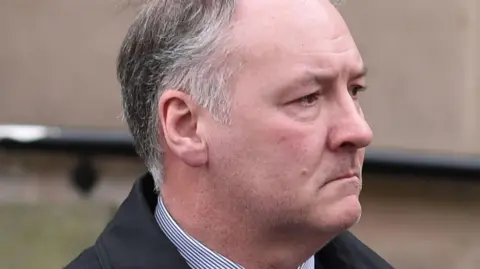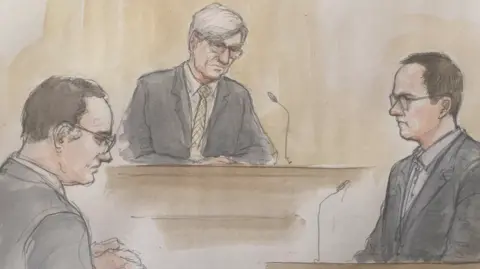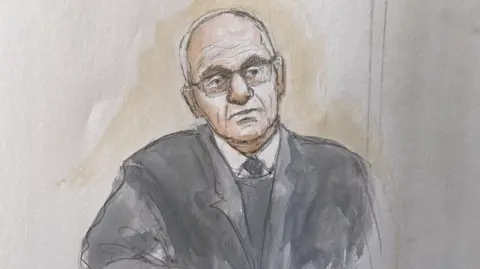Paterson inquests go on despite refusal to attend
 PA Media
PA MediaJailed breast surgeon Ian Paterson has refused to attend to give evidence at the start of inquests into the deaths of 62 of his patients, despite being ordered to do so.
The hearings at Birmingham and Solihull Coroner's Court will determine whether Paterson's patients died an unnatural death as a result of his treatment.
The first inquest opened on Tuesday, hearing how Chloe Nikitas from Tamworth was "devastated" and "shocked" when her cancer returned three years after an operation carried out by Paterson.
Her partner Klaus Ströhle described how the "cleavage-sparing mastectomy" had left breast tissue behind.
On Monday, Judge Richard Foster had ordered Paterson to attend, denying an application by his solicitors to revoke a witness summons.
However, his offender supervisor told the court Paterson told him that morning he would not attend because proceedings were unfair and "biased".
Paterson is currently serving a 20-year sentence after being jailed in 2017 for 17 counts of wounding with intent and three of unlawful wounding relating to 10 patients.
 Helen Tipper
Helen TipperIn a statement read to the court, Mr Ströhle described his partner of 18 years as a "beautiful, petite and incredibly smart woman".
After completing a PhD in atmospheric chemistry she conducted research in Germany under Nobel-prize-winning chemist Paul Crutzen.
"She was a very independently-minded woman and not one for convention," the statement continued.
Mr Ströhle described how Ms Nikitas was first diagnosed with cancer in 2002 when her son was two, and "fought fiercely to be there for him".
"[She] wanted to shield Max, to leave him some happy memories of her in his childhood," his statement added.
'Nothing to worry about'
Mr Ströhle told inquest counsel Jonathan Jones that his partner first saw Paterson privately in June 2002 after a biopsy found cancer in her left breast.
"Chloe was very young, she was obviously concerned about what she would look like after the operation," he said.
"He explained what it was, saying there would be some folds of skin left behind to make it look like the cleavage was normal and he was working with a very excellent cosmetic surgeon," Mr Ströhle said.
He said the couple were not made aware there would be an increased risk of the cancer recurring if breast tissue were left behind.
"You trust in your doctors, right, that they will do the best thing for you and they’re not going to jeopardise your health," he said.
Following the surgery and a reconstruction carried out by a second surgeon, Ms Nikitas initially appeared to recover well.
However, she revisited Paterson after finding a new lump in spring 2005.
The surgeon told her there was nothing to worry about, and to return for a routine check-up in six months, the court heard.
In October of that year, a biopsy found a Grade 2 ductal cancer, the same grade as her original cancer, Mr Ströhle said.
"Chloe was obviously shocked... because how can it be that she had cancer again in the reconstructed breast?" he added.
When they asked how the cancer had returned, he said: "We were just told it was pure bad luck.
"We were both under no illusion that this was a death sentence. This was metastatic cancer and it was going to be terminal."
Ms Nikitas died three years later, aged 43.
Paterson, who practised as a consultant surgeon from 1998 until 2011, treated patients at Solihull Hospital, then part of Heart of England Foundation NHS Trust.
He also practised privately at Parkway hospitals in Solihull and Little Aston in Sutton Coldfield, both run by Bupa until 2007 and afterwards by Spire.
Katie Gallop, counsel representing Spire Healthcare, asked Mr Ströhle if anybody else had been present when "cleavage-sparing reconstruction" was discussed.
He replied that a nurse, Bethan Owen, had also been present.
He said the surgeon's description of the procedure was as "the latest, best new thing that he has developed and there’s nothing to worry about".
 Helen Tipper
Helen TipperThe inquest also heard via video-link from retired consultant oncologist Mr Tal Latief, who Ms Nikitas was referred to for chemotherapy.
He told the coroner he treated patients referred by Paterson and considered him a "very good" surgeon.
When questioned by Mr Jones, he said he only became aware of issues relating to the surgeon's practice through the media.
"I was really shocked because I never heard of a cleavage-sparing mastectomy, never heard about it anywhere," he said.
The judge reserved his position on a penalty for Paterson for his refusal to attend, which could comprise of a maximum custodial sentence of 28 days for contempt of court.
"I hope he will review and reconsider," he added.
The inquests will also consider failings in Paterson's recruitment and supervision, and systemic failings in hospital management, regulatory authorities and the NHS.
In addition, they will look at whether the culture at hospitals involved was to address and prevent substandard treatment.
Hearings are expected to continue for a period of at least eight months.
Follow BBC Birmingham on BBC Sounds, Facebook, X and Instagram.
